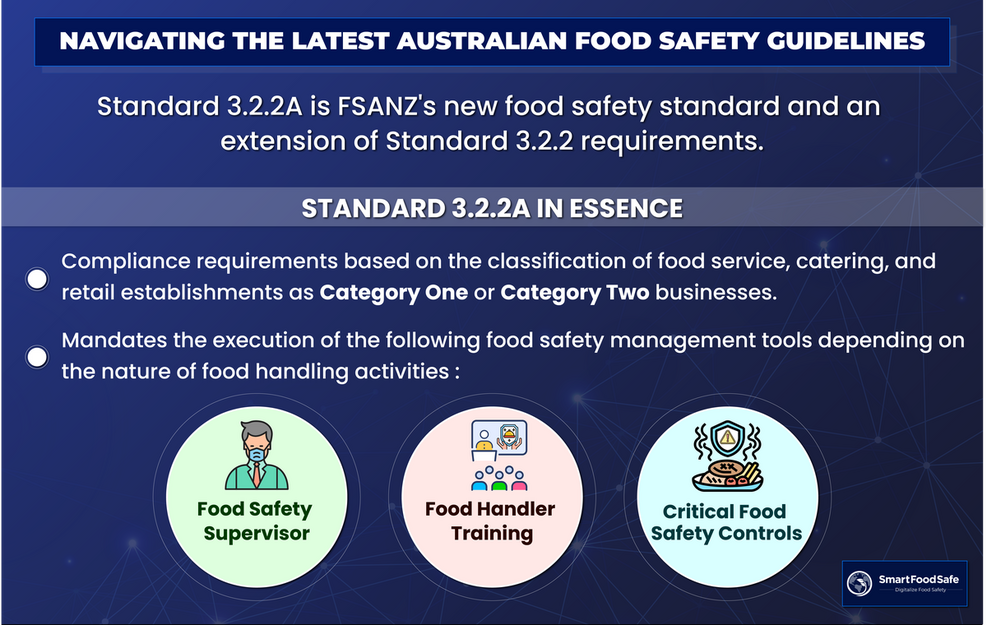
As of December 8, 2023, significant updates to food safety standards are set to roll out, affecting a myriad of Victorian food businesses. Food Standards Australia New Zealand (FSANZ) has ushered in a new set of guidelines known as Standard 3.2.2A – the Food Safety Management Tool, reshaping the paradigm for those involved in food preparation and service.
Standard 3.2.2A in Essence
Food businesses across Australia are required to adhere to the regulations outlined in Standard 3.2.2 and Standard 3.2.3. For food service, catering, and retail establishments, compliance with Standard 3.2.2A is necessary, contingent upon their classification as category one or category two businesses.
Category One Business
A caterer or food service business that processes unpackaged probable hazardous food into food that is both ready-to-eat and potentially hazardous food. The food is then served to a consumer to eat without any further processing.
Category Two Business
A retailer of potentially hazardous, ready-to-eat food, where the food was handled unpackaged but not made or processed on site (other than slicing, weighing, repacking, reheating, or hot-holding).
The following requirements are to be enforced due to the elevated risk associated with unpackaged, potentially hazardous food prepared for immediate consumption, necessitating vigilant handling to ensure safety:
Category one businesses, which pose higher risks, are mandated to carry out the specified three food safety management tools.
Meanwhile, category two businesses are obliged to have a designated food safety supervisor along with trained food handlers.
The new standard also mandates the execution of two or three food safety management tools, depending upon the nature of food handling activities:
Food Safety Supervisor
A food safety supervisor (FSS) must hold official certification as an FSS acquired within the last five years. They are required to possess up-to-date, pertinent expertise and abilities necessary for the safe management of food, particularly high-risk food items.
The role of the FSS is to make sure the business is handling food safely. They can do this through instructing staff, reviewing and updating business procedures, and inspecting food handling operations and the premises.
Where potential hazards are identified, the FSS is required to make sure risks are managed, and issues are prevented or corrected. Food businesses also have to ensure that the food safety supervisor is reasonably available to advise and supervise each food handler engaged in that prescribed activity.
The FSS is also critical in sharing skills and knowledge and improving awareness of what can happen if food is unsafe – that is, foodborne illness and injury and its impacts. This helps foster a positive food safety culture, where food safety is a top priority in ‘the way things are done around here.’
Food Handler Training
Training for food handlers should encompass the secure handling of food, prevention of food contamination, maintenance of cleanliness and sanitation within food facilities and equipment, as well as personal hygiene.
Food establishments are required to verify that all individuals handling food have either completed a food safety training program or possess the relevant skills and knowledge before commencing the handling of high-risk food items.
Food safety training course means training in food safety that includes training in each of the following:
Safe handling of food
Food contamination
Cleaning and sanitizing of food premises and equipment
Personal hygiene
Substantiation of Critical Food Safety Controls
Businesses are required to maintain records or provide evidence of compliance with safety protocols for receiving, storing, processing, exhibiting, and transporting potentially hazardous food, as well as for cleaning and sanitizing. These specified regulations are termed as 'prescribed provisions.'
The business must exhibit how these standards have been fulfilled or validated. Unless alternative means of meeting requirements can be demonstrated and proved to an authorized officer (food regulator), the business must maintain a record showcasing its adherence to these stipulations.
The intended outcome is that a category one business actively monitors and manages key food safety risks related to food temperature control, food processing, and cleaning and sanitizing.
Adapting to these new measures is imperative for businesses within the Australian food industry to ensure adherence to updated food safety standards and maintain consumer trust. In the dynamic scenario of food safety regulations, businesses often encounter the perpetual challenge of meeting rigorous standards while ensuring seamless operations. This is where Smart Food Safe comes in as a guide for food enterprises to excel in the realm of food safety compliance as new amendments are introduced in food legislation with a suite of unique smart software solutions.
Smart Food Safe as a Tech-Based Enabler for Food Industries to Stay Compliant
Smart Food Safe stands at the forefront, delivering advanced technology solutions tailored to empower businesses in managing Quality, Food Safety, Regulatory, and Traceability at an unprecedentedly affordable price. Our innovative software solutions are specifically engineered to cater to the diverse needs of the food industry, equipped with comprehensive tools capable of making conformance to Standard 3.2.2A a walk in the park, such as given below:
Real-Time Food Safety Supervision: Smart Food Safe incorporates features that enable streamlining monitoring, analysis, and paperwork through modules such as Smart EMP, Smart HACCP, Smart Lab, and many more, guaranteeing ongoing adherence to the new standards effortlessly by facilitating real-time oversight and management of food safety protocols.
Learning Management System: Smart Training is designed to deliver customizable training programs, ushering efficient education on food safety protocols to all stakeholders. This platform employs interactive self-learning and group learning capabilities, assessments, and certifications while meticulously maintaining compliance records.
Digital Documentation & Record-Keeping: Simplifying the substantiation of critical food safety controls, our software comprises Smart Record and Smart Docs with features for digital documentation, data collection, and validation mechanisms. It establishes a robust framework for presenting compliance evidence during audits or inspections.
Investing in Smart Food Safe can bring forth heightened efficiency, enhanced food safety standards, and sustained compliance in the ever-evolving regulatory landscape.
_1.png)